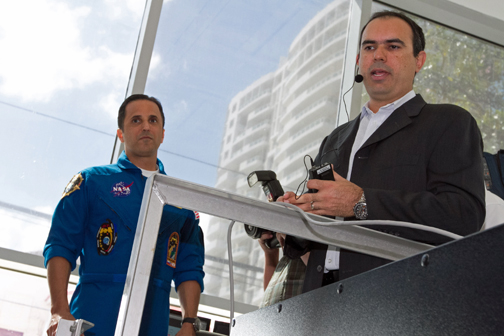Polytechnic Univ. inaugurates aerospace lab


Astronaut Joseph Acaba, left, looks on as Prof. Rafael Jiménez-Vélez, mechanical engineering professor, explains the flight simulator’s featured.
The Polytechnic University of Puerto Rico inaugurated Thursday a new aerospace laboratory at its Hato Rey campus that houses the first flight simulator on the island. The facility aims to train future aerospace engineering professionals to enter the highly specialized field currently booming on the island, school officials said.
The Hato Rey college’s aerospace program took flight in 2008, when demand for skilled engineers began to grow as aerospace companies established themselves in Puerto Rico in response to Patriot Act requirements for equipment and technology to be built by U.S.-based companies.
So far, seven companies have planted their flag on the island and most have reached out to academia to align curricula with employment needs.
In response to that, the Polytechnic began drafting a proposal and submitted a funding application to the U.S. Department of Education, which subsequently granted the Polytechnic University $544,000 for five years to develop the program and the state-of-the-art lab, said Carlos Alvarado-Díaz, professor at the school’s mechanical engineering department and aerospace lab director.
Aside from the flight simulator, the new lab includes a wind tunnel, a helicopter turbine, a nozzle station, and a vibration-measuring station — all elements that will help students gain practical experience in the field for which they will work.
“The MOTUS 622i Flight Simulator will allow our students to enter the simulator cabin and experience, first hand, the viability of their designs in the most realistic simulated flight training environments in the market,” Alvarado said.
“Furthermore, students interested in developing skills as a pilot can rely on this tool for registered flying experience. The MOTUS 622i allows us to offer 2.5 hours of flight experience for private pilot certificates, 50 hours of flight experience for commercial pilot certificates, and 25 hours of flight experience for airline transport pilot certificates,” he said to describe the capacities of the simulator worth more than $250,000.

Acaba, whose parents hail from Puerto Rico, takes the Polytechnic University’s simulator for a spin Thursday.
The simulator’s training components are approved by the Federal Aviation Administration and allow students to research existing aircraft in the market and develop new designs. It also allows students and researchers to evaluate a myriad of elements in these aircraft, including panel, fuselage, weight, balance, engine, and flight dynamics.
“For more than 46 years, our institution has opened the doors of knowledge to thousands of students with an important mission in mind: the development of professionals and leaders who will forge a dynamic and innovative progress for Puerto Rico and the world,” said Polytechnic President Ernesto Vázquez-Barquet. “With this mission as our north, we continue to develop our educational tools and technologies through the launch of our new aerospace laboratory.”
Present for the inauguration was Astronaut Joseph Acaba, who spoke of the benefits of such training equipment to aircraft operators.
“The value of this simulator is not just in having it here but in the experience the students will gain by learning what aircraft operators require. There’s a big difference between learning the theory and another getting hands-on practice. That’s very, very important,” said Acaba, who spent about four months living and working in the International Space Station last year.
The new aerospace lab is part of the research and practice areas of the Polytechnic’s Bachelor of Science in Mechanical Engineering with a major in Aerospace Engineering Program offered by the Department of Mechanical Engineering of the School of Engineering and Geomatic Sciences.
The equipment will complement the courses in mechanical engineering and aerospace engineering, such as aerospace structures, mechanical and aerospace systems and controls, high speed aerodynamics, stability and vibration of systems, composite materials, computational fluid dynamics, and turbo machine theory, as well as offering flight hours for pilot certification.
During the news conference, Alvarado-Diaz said there are about 130 students interested in enrolling in the Bachelor’s degree track, with the potential to graduate next year.














